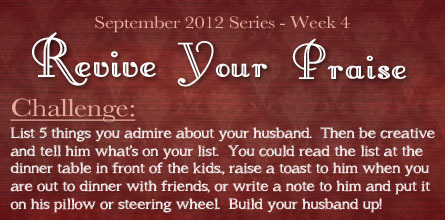Sheila Wray Gregoire's Blog, page 260
September 23, 2012
Revive Your Marriage 4: Revive Your Praise

Revive Your Marriage Series
It’s time to…Revive Your Marriage! This month I’m joining three bloggy friends, and every Monday we’ll all write our own posts on how you can Revive Your Marriage!
We’ve talked about reviving your attitude, reviving your friendship, and reviving your prayer life. Next week we turn to my favourite–Reviving Your Sex Life!
But today we’re going to tackle “reviving your praise”.

I know many of my readers really struggle in their marriages. Is the change really all up to me? they say. What about my husband? And many of you are hurting.
And I know that you’ve read advice saying, “you need to express gratitude towards your husband“. I’ve written about that myself, too! And I do believe it. Men thrive on appreciation; when they feel judged and inadequate, they often retreat. Praising your husband does two main things: it helps your husband feel empowered, but it also helps you to feel more positively about him. After all, the things we say out loud also become the things that we think. Sometimes by making ourselves think of positive things to say, we start noticing more positive things! And that, in and of itself, can transform a marriage.
But I want to take this a little bit further today and look at what praising our husbands really means.
It means that we’re agreeing with God.
Let me explain. The reason so many of us have a hard time praising our men is because we don’t feel particularly positive about them right now. And if we try to force ourselves to find positive things to say, aren’t we then lying? Or at least distorting the truth? After all, this isn’t really how we feel. And if I’m going to be honest with my husband, I need to be honest about my feelings, don’t I?
And how can we maintain, or even create, an intimate marriage if honesty is not at the heart of it? If my husband is hurting me, you may say, then I have to let him know. I can’t go around saying all kinds of nice lovey dovey things that I don’t even feel in hopes of changing him, because that’s not honest. It’s manipulative. And it’s the opposite of intimacy.
Well, yes. And no.
The question is what we mean by honesty. To be honest means that you tell THE TRUTH. But what is the truth?
Here’s where things get interesting. The truth is not always how you feel. When we tell the truth, it simply means that we are agreeing with God about something, because Jesus is The Truth. So praising your husband is simply the same thing as telling the truth about the positive things that God is doing in his life, whether or not you are also feeling negatively about him. Do you see the difference?
So you may be angry that your husband is lazy around the house, but has God made him a good provider? You may feel that he doesn’t share his emotions enough, and that he’s curt with you, but is a natural leader? Is he decisive? Is he easy to respect? Call out those positive things that you see in him. Is God slowly changing him? Notice these changes!
One woman sent me an email recently saying that she had felt convicted lately because she had too many expectations on her husband. She was expecting him to be everything that God said a godly man would be, and when he didn’t measure up, she felt angry. But she knew that she had to stop holding him up to the ideal, and simply see him as he was right now: a man that God created, that God loved, and that God was molding.
Right now, your husband is a man that God loves. Your husband is a man that God is molding. And that is all a good thing! And when you call out the things in your husband’s life and character that are good, you are agreeing with God about him. Sometimes, even in the depths of our disagreements with our spouses, when we take a step back and say, “this is what I admire about you”, what we do is we put the focus back on what God is doing, and away from our own hurts.
But what about our needs?
Well, this weekend I threw up a reader question on this blog about what to do when your husband’s poor eating habits are endangering his health, but he refuses to eat healthy food that you cook. The comments on that post were most interesting, and I want to write a follow-up post tomorrow to deal with some of them. The theme of some comments, though, were: “I don’t like being told not to nag. If I’m upset about something, is it really nagging to say it? Don’t I have to tell my husband?” And in a way, I’d agree (come back tomorrow to find out more about why!). When we talk, we need to agree with God, and if there is an area where you feel that your husband is endangering the relationship, yes, you must speak up.
But it is so much easier to speak about that if you are also, and even first, telling the positive things you see in your husband. God doesn’t bash us over the heads with all the things we do wrong; he rejoices over us with singing, and then he gently shows us where we’ve strayed.
It’s not wrong to tell your husband why you’re upset. You need to have ways to talk to him frankly about things. But may I suggest that laying a foundation of praise, where you agree with God about your husband’s good qualities, is so important first?
So here’s this week’s challenge:
My three blogging friends have also written on this today, and you can see what they have to say, too!
Courtney from WomenLivingWell, Darlene from TimeWarpWife.com, and Jennifer from UnveiledWife.com have all written awesome posts on praise! Click on through to see what they have to say.
And you can have your say, too! Just leave a comment to tell us the struggles you’ve had with friendship, the solutions you’ve found, or what you love doing together.
Join us next Monday when we talk about how to “Revive Your Sex Life”!
Sheila is the author of The Good Girl’s Guide to Great Sex. Don’t settle for mediocre in your marriage when God wants so much more for you!
Related posts:
Revive Your Marriage: Revive Your Attitude
Revive Your Marriage: Revive Your Prayers!
Revive Your Marriage 3: Revive Your Friendship




September 22, 2012
Reader Question of the Week: Healthy Tug-O-War
 Every weekend I like to throw up a question someone sends in and let you readers have a go at it. This week a reader asks about conflict in marriage and cooking healthy meals.
Every weekend I like to throw up a question someone sends in and let you readers have a go at it. This week a reader asks about conflict in marriage and cooking healthy meals.
My hubby and I are on totally different sides right now when it comes to food- I’m trying to change our diets to be healthier, but he just isn’t having any of it. He wants to keep eating junk, so I cook healthier versions for me and the kids and make him the junk, or I make the healthier stuff and listen to him complain. The tension between us is palpable, and it’s been like this for several weeks. I *know* I should submit, but I feel like I’m serving a death sentence with every bowl of pasta (he’s diabetic, high blood pressure, heart disease, etc.). I’ve made some concessions (more gradual changes, “cheat” meals), but with all the hurt between is, they don’t seem to be helping. I’m struggling right now, our marriage is struggling on every level, and I’m just lost.
What advice would you give?
Don’t forget: The Good Girl’s Guide to Great Sex makes a great gift for any woman!
Related posts:
Reader Question of the Week: Wait, He’s Watching THAT?
Reader Question of the Week: Is it Trust or Accountability?
Reader Question of the Week: Keeping a Schedule




September 21, 2012
What a Beautiful World

Photo by Austin Skipworth
Every Friday my syndicated column appears in a bunch of newspapers in southeastern Ontario and Saskatchewan. This week’s column is about the true nature of God–Creator .
The world is filled with so much beauty. Is there anything as adorable as a baby’s chubby wrists? Or as heart stopping as the first kiss with someone you love? Walking out in nature is a feast of beauty, too: the rainbow after the storm; the bird songs that announce the arrival of spring; the mountains that steal one’s breath away.
If one is to believe in God—and I do—then I think these little glimpses of our natural world show us something fundamental about him. God’s actually pretty good.
That is not to say that life is always trouble free, but I wonder how many of our hardships are really God’s fault, and how many are simply the stuff of life? A good friend of mine, in his forties, was just diagnosed with cancer. Earlier this month our family marked the sixteenth anniversary of my baby boy’s death. Life is certainly full of pain. Yet perhaps the reason we recognize the pain and rage at it is primarily because we also know joy, and have come to expect it. If life weren’t usually sweet, would the pain be as great? Even those who don’t believe in God would, I think, look at the evidence and conclude that life is indeed supposed to be lovely.
All of these thoughts were going through my head last week on the anniversary of September 11. When stories of heroism and bravery and generosity hit the airwaves again, it brought tears to my eyes. After all, it is often in the midst of ugliness that beauty is most apparent. The people who carried a man in a wheelchair down seventy flights of stairs; the firefighters who fought to free a seriously injured woman, and lost their lives in the process; even the generous Newfoundlanders who found their towns inundated with stranded passengers, and took them into their homes—all of these responses show our essential goodness. North America reacted to horrible acts of violence by displaying, instead, beauty.
Then last week, after we had listened to these stories anew, violence erupted again, as fanatics in the Middle East decided to attack American embassies, killing four in Libya. And once again, they did it in the name of God, under the terrorist flag of Al-Qaeda.
The real work of God is in creating, not destroying. It’s in bringing forgiveness and healing, not in killing and maiming. It’s in what our soldiers do protecting the innocent and standing up for freedom, rather than what their soldiers do in targeting the innocent and eliminating freedom.
I’m sure that these fanatics think that they are doing the work of God, but I’d ask them to open their eyes and look around at the world. Can a God who made the Grand Canyon, and the coral reef, and a baby’s chuckle be the same God who wants you to kill indiscriminantly? Do you really think that you’re doing God a favour? Can’t you see that with every act of terror you solidify our determination to never believe what you believe?
I understand the urge to justify one’s culture, or to try to preserve what one has, or to attack others who seem to have more than you. What I don’t understand is thinking that any of that has anything to do with God. And to those who are tempted to dismiss God altogether because people do such awful things in his name: just look at the beauty in the world. That tells us far more about God than anything that involves machine guns or slitting people’s throats. And perhaps if we all opened our eyes more to beauty, there would be far less horror in this world that we share.
Don’t miss a Reality Check! Sign up to receive it FREE in your inbox every week! Subscribers, sign up HERE.
Related posts:
Keeping Up Appearances
Are We the World?
When the World Isn’t Safe for Women




September 20, 2012
Emotional Affairs–The Dangers are Real

Today’s post is a guest post from Marsha Rozalski, author of Godly Whispers: A 90-Day Devotional to Help You Recover from Your Spouse’s Affair
“People with integrity walk safely, but those who follow crooked paths will slip and fall.”
(Proverbs 10:9, NLT)
Last year I had a Christian woman tell me she found her “soul mate.” I was more than intrigued since I knew she’d been married over 20 years. There were warning bells going off and I felt my stomach drop as she told me her story. I knew she was falling into an emotional affair and she was heading down a very slippery slope that never has a happy ending.
Her church hired a new choir director and, as all affairs do, it started out very innocently. He would compliment her on her voice, giving her praise and attention every practice. His words stirred up feelings inside her of loneliness and longing for affection. Feelings she didn’t even realize she had. If she’d only realized she was feeling lonely and ignored by her husband she could have talked with him about her feelings. But instead of turning to her husband, she turned to the new choir director.
She started staying behind after everyone left so she could talk with him. Over these “chats” he told her his marriage was not doing well and she in turn did the same. Before either of them realized it, feelings of attraction started stirring in their hearts. She told me how much she enjoyed their chats, that he understood her and that they had a “real” connection. She then told me she just knew he was meant to be her true “soul mate.”
This “soul mate” idea can do a lot of damage. When you pledge yourself before God to someone in marriage, you become soul mates.
“A man leaves his father and mother and is joined to his wife, and the two are united into one.’ Since they are no longer two but one, let no one split apart what God has joined together.”
(Mark 10:7-9, NLT)
Christians seem more likely to get mixed up in emotional affairs. They feel it isn’t sin if there’s no touching involved. An affair is not defined by whether you have sex with the other person, but rather the secrecy involved and the fact that a spouse is being betrayed. Think about it: would you be hurt if your spouse had a “secret friend” that he or she shared their deepest secrets with that you knew nothing about?
Years ago, I remember a woman that started an emotional affair with another man she felt she had more in common with than her own husband. I guess the children they shared didn’t count. She became so entangled with this man that she left her husband for him. They didn’t last a year. Today she’s alone and the children are shuffled between both of them. Many times we find ourselves suffering from the “greener grass syndrome.”
We need to learn to be very honest with ourselves and God. Even thinking about and wanting to have an affair is sin.
“‘Don’t go to bed with another’s spouse.’ But don’t think you’ve preserved your virtue simply by staying out of bed. Your heart can be corrupted by lust even quicker than your body. Those leering looks you think nobody notices—they also corrupt.”
Matthew 5:28 (The Message)
Know this; an emotional affair is only the beginning of a physical affair.
This issue isn’t only for those who are married. I’ve known singles–both men and women–who struggled with falling for someone who’s married. We must all learn to guard our hearts against developing inappropriate friendships with the opposite sex. If you’re in a “friendship” with someone of the opposite sex that isn’t appropriate, I strongly urge you to end it now. You must stop feeding this addiction and run away from this sin. Do everything possible to make this happen including changing your email address, phone numbers and daily routines.
Always guard your heart and avoid inappropriate friendships with those of the opposite sex. Never speak of your marital problems or personal issues with someone of the opposite sex, save that for your same sex friends or a counselor. Have someone keep you accountable and ask how you are doing every now and then with your friendships. If you are married, take the time and effort to invest in your marriage. After all, your husband is your only true soul mate.
You can find Marsha’s book here: Godly Whispers
Also here are a couple of articles I have written on emotional affairs that may help you, too:
How to Stop an Emotional Affair (http://tolovehonorandvacuum.com/2011/10/wifey-wednesday-how-to-stop-an-emotional-affair/)
Why Affairs Happen (http://tolovehonorandvacuum.com/2011/10/why-affairs-happen-hint-theres-not-always-a-reason/)
Related posts:
Wifey Wednesday: When He’s Not Emotional
Celebrating our Differences
Why Affairs Happen (Hint: There’s Not Always a Reason)




September 19, 2012
Wifey Wednesday: When Mr. Clean Marries Mrs. Messy
It’s Wednesday, the day when we talk marriage! I post on a marriage topic, and then you all can link up your own marriage posts, or leave a comment with your own advice!
Every Saturday I throw up a Reader Question of the Week on the blog and let you all take a stab at it. Sometimes this is because some of you may have experience at something that I don’t, but often I have my own opinion, but I want to let others have their say, too. There’s often wisdom in a multitude of counsel.
But I did want to comment on last Saturday’s, because I think we can learn some important marriage principles from it. So here was the question:
I have a really hard time cleaning, I hate it and my definition of clean is more like tidy. Even that, though, is a stretch for me. When I was living at home I used to fight so hard with my dad because my room was always a disaster and many times it trailed out with me. Even at work, I am messy as I go about my business but I clean everything up at the end of the day.
Once my husband and I were married, I would pick up after both of us. I was constantly picking up his dishes and socks. So many socks. Doing our laundry, cooking our dinners… Everything that I figured would make him think I could be a good house wife. But that’s not me. So when my husband would travel on business, I began living in my house the way I normally would. It never really got to the point that I thought was terrible but when my husband would come home on the weekends I would make a mad dash on Friday to clean the house because I knew he would freak out. With my limited time however, it never really got “his clean”.
Now we are having it out because he is home and gets to see that my daily routine doesn’t really include cleaning. He’s really upset by this and wants me to clean more, but I don’t feel like that’s me. And we can’t seem to come to a compromise. I think it’s my house, too, and I need to be allowed to set some of the standards. What should we do?

Lots of you left some really thoughtful comments! If you’re looking for practical solutions about cleaning, the comments section does have quite a few, and they’re great!
One theme that was repeated a few times was “hire a maid”, and this can be a good solution for some. Personally, I tried the maid route at one point and it never worked. Maids come to clean, not to tidy, and if you have stuff lying around, they can’t do their job. So before the maid arrived, I had to massively tidy. It was more work for me than not having a maid! And tidying takes way longer than cleaning. Cleaning is not the problem; it’s keeping things in their place, especially when you have kids. And I also wanted to make sure my kids grew up knowing how to clean. So a maid isn’t always the best plan.
But I think the reason that a maid can’t always solve the problem is that there’s something bigger going on here, and it’s this:
Most conflicts we have in marriage aren’t about the issue itself. They’re about the question: do you really love me? Do you value my opinion? Do you care?
In this case, the husband wants to know, “do you care what I think about the house enough to leave your comfort zone“? And the wife also wants to know of the husband, “do you care what I like enough to leave YOUR comfort zone?” So it’s hardly surprising that they both dig in, because the issue is not how tidy the house is. The issue is, “do you care about me enough to change?”
That’s what a marriage is all about: it’s a give and take, and adjusting to one another, and finding a new way of living that works for both of you. But when we’re first married we’re often really insecure about that. We want to know that we matter. And the thought of having to change or do things “his way” is very threatening because it feels like he doesn’t love me for who I am. And this is just “who I am”.
Here’s the thing, though: when you married, you promised that you would now be “one flesh”. That doesn’t mean that you cease to exist, but it does mean that what he wants needs to be important to you now, too. And we are called to consider others interests ahead of our own (Philippians 2:4). We are even called to submit. So if your husband isn’t happy with the home, that should matter to you, because HE should matter to you.
I actually wrote in The Good Girl’s Guide to Great Sex about a very similar situation that my husband and I faced. I said:
When my children were six and four, I was very active with them. We ventured out to the library twice a week, to playgroup once a week, to women’s Bible study, to friends’ homes. We had other children in our home. We made crafts. We baked. Our home was fun, but it was also always a complete mess.
One day Keith sat me down and told me he was sick of coming home to a disaster in the living room. He could handle the basement being a mess; he could even handle their rooms or the bathroom being a mess. But he just wanted to open the door and see an inviting house.
I did not take that very well. I think the words “maid” and “Neanderthal” escaped my lips. But looking back, I can see how I was telling him, “I know what’s best for the kids; I’m home all day; so you need to bow to what I say.” My husband was not the kind who would retreat, for which I am eternally grateful. But I can see why many in his situation would. He was being told that his opinion didn’t count for anything, and that while he wanted a place in this world that reflected him, I was more interested in what I envisioned for the family.
Ladies, if you have already walked down the aisle, remember: he is your husband. His opinion about how the household functions matters, even if you’re the one who primarily cares for it. If something is important to him, it should matter to you. Some men retreat simply because they get the impression that they aren’t wanted, and so they try to carve out a place in the world where they can escape. Before blaming him for running away emotionally and sexually, ask yourself if you have done anything to push him out. And if you have, maybe it’s time to ask his opinion and start honoring it again.
If you’re struggling with this in your home, take a deep breath and think of this in its wider context. Should your husband’s opinion matter? Do you want him to feel like this is his home, too, or do you want him to retreat elsewhere? If you married him, you made a promise that he mattered. So do something about it!
I’m not a naturally neat person, but I’ve learned how to put little habits into my day that make things work more smoothly. After my shower I make the bed and throw a load of laundry on. I keep the piles of papers on one place in the dining room, and clean off the kitchen counters, living room surfaces, and dining room table. Every evening before dinner the girls and I do a 15-minute tidy up (it’s amazing how much you can get done in 15 minutes). Honestly, if you just stick to little things throughout the day, the house will not get impossible. And sit down and ask your husband which areas he really, really wants tidy. Maybe the front hall matters to me because it’s the first thing he sees. Maybe he just wants to see a tidy kitchen, or a living room without toys in it. Uncover what’s the most important, and then make sure to honor that. It doesn’t need to be onerous. And it’s just showing him that you value him, that you want him to feel at home when he is at home, and that you’re willing to go out of your way to make sure that he does.
That’s a good message to send to your husband. It keeps you on the same page!
But with this issue, as with most, remember that the reason that we get into conflict is not the issue at all; it’s that central question, “do you really love and value me”? If we can see that this is really the issue, perhaps we’d have an easier time compromising and reaching out.
Now, what advice do you have for us today? Leave the URL of your own marriage post in the linky below, or leave a comment and tell us how you’ve resolved difficult things!
Related posts:
Reader Question of the Week: Clean Standards
Wifey Wednesday: Stop the Urge to Correct Him!
Wifey Wednesday: What Does Submission in Marriage Mean?




September 18, 2012
Do We Expect More of our Christian Teens Than we Expect of Ourselves?

Recently an older post of mine, 5 Steps to Raising a Teen Who will Stay Christian, has received a lot of traffic on Pinterest, and revived some old debates.
In that post, I noted that children of Christian parents who went to Christian schools or were homeschooled were far more likely to still embrace Christ as adults than were kids who went to public schools. I had some push back in the comments from people saying that you really shouldn’t shelter your kids, and the public schools need them there to be missionaries anyway.
I understand that point of view, but two other events lately have made me wonder if we ask more of Christian teens than we would ever ask of ourselves.
1. Several people I know recently quit jobs and took new ones because they found their work environment toxic
2. A youth group I know has fallen on hard times because the vision has become blurry
Let me explain how both of these things relate, by looking at the pressure we often put on Christian teens.
We say to them: “You are the light of the world. You need to be a light in your high school. Go there and minister, even if the culture is completely anti-Christian, even if you are mocked, even if you are bullied, even if you have no friends.”
Now, we may not say that in so many words, but many kids have very toxic schools, and they can’t escape. If adults had to spend all their time in an environment with people who chose very different lifestyles, who pressured them to do things they didn’t want to do, and where they had little in common with anybody, those adults would likely leave. As I said, I know several adults who have recently left jobs behind because the environment was just too toxic.
We have the luxury of doing that. Kids do not. It’s very difficult to change public high schools. And so if you’re in a bad environment as a teen, you’re stuck. Now, not all teens have horrible high school experiences. My husband certainly didn’t, and I got through school simply by focusing more on my part-time jobs and ignoring the kids I went to school with. Yet there’s no doubt that many kids find high school extremely emotionally difficult, largely because the culture is so antithetical to what they believe.
What about saying, “yes, but it’s a mission field?” That’s certainly valid. But here’s the thing: the adults who spend all their time among people who disagree, and who have very different lifestyles, and who are difficult, tend to be missionaries. They aren’t “regular” adults, because the “regular” adults tend to take jobs with people who are like them, or at least whom they find friendly and interesting.
Now, I do believe in missions and outreach, but we don’t require all adults to do this full-time. We do, however, ask it of teens. We ask them to go into what is more or less a very hostile environment for them, their entire working day, while we do not ask the same of ourselves.
My kids do not go to public high school, but that doesn’t mean that they don’t spend any time witnessing. I can’t go into too much detail on a public blog, but let’s just say that they each are involved in part-time jobs and extracurricular activities where they talk a lot about God to people who aren’t Christian. They do what we ask adults to do; they just simply aren’t immersed in a negative culture 100% of the day.
Here’s another thing: when we send out adult missionaries, we train them for it. They expect opposition, and they learn to deal with it. When we send out teens into a negative environment, we expect them to handle it, even though they are only teens, and they aren’t yet adults.
Then, if teens struggle, I’ve heard people say the equivalent of, “we can’t take them out, because they need to be missionaries“. That doesn’t wash with me, because we don’t even ask ADULT Christians to do that. (whether or not we should ask adults to do that is another story). So if your teen is really struggling in high school, or is becoming very depressed, then we parents should take that under consideration, rather than feeling that they should suck it up because it’s a mission field.
But that’s not the only problem with the way we’re raising Christian teens. When adults are involved in a church community, we expect to be fed. We form small groups so that we can talk with other adults about Scripture, and pray for each other, and wrestle through the hard things in life. Then we also have outreach activities. We reach out to neighbours and invite them to church. We volunteer in the community. In short, we do both. We get fed, but we also do outreach.
When it comes to teens, though, we often ignore the “feeding” part. Most churches see youth groups as one of their main outreach platforms. We want to get as many teens out to youth group as possible, so we make it a fun, relevant night for teens in general. We don’t go deep into Scripture. We just present the gospel, or a watered down version of it, so that other kids will feel comfortable. Our main emphasis is on helping non-churched kids feel comfortable.
Again, this is a very worthy and important goal. If a church is not involved in outreach, then the church will die, and it is not fulfilling the mission that Jesus set for us in Matthew 28:19-20. But if you look more carefully at those verses, it is not only about outreach. Jesus said:
Therefore go and make disciples of all nations, baptizing them in the name of the Father and of the Son and of the Holy Spirit, and teaching them to obey everything that I have commanded you. And surely I am with you always to the end of the age.
We are to do outreach, but we are also to feed those who have already accepted Christ. We are to do both. When youth groups are too focused on outreach, then those who want to go deeper with Christ often don’t have a place where they can study the Scripture or ask the hard questions. And so these kids flounder, and become otherwise disillusioned.
Most churches are too focused on adult growth and not enough on adult outreach. We let adults in the pews have it pretty cushy. We go to small groups and Bible studies and have friends and don’t really do enough reaching into the community.
But at the same time, I think we ask too much of our teens. We ask them to focus only on outreach, but we don’t give them enough time and opportunity to really grow in the Word. Most of our teen activities are oriented around outreach, and not around spiritual growth.
So we expect our kids to be missionaries in hostile environments, even when we ourselves would not be, and we expect our kids’ involvement in church to be oriented around outreach, even when ours is not.
Perhaps the answer is found in the middle; we need to give our teens opportunity to grow, and not expect them to be mature missionaries at 14. But we also need to make ourselves get out of our pews and do more outreach ourselves, rather than relying on the kids’ and teens’ programs to grow our churches.
My rule of thumb when it comes to teens is that we should never ask them to do more for God than we are willing to do ourselves. If we do, then we’re not being good stewards either of the children that God has given us, or of the mission that God has given us to the wider world.
So, to sum up: no, we should not shelter our children unnecessarily. We need them to be involved in outreach. But we also need to recognize that they are still young Christians, and giving them opportunity for growth, and protection from attack, is not unreasonable as parents.
What do you think?
Related posts:
5 Steps to Raising a Child Who Will Stay Christian
How to Keep a Healthy Sex Life with Teens in the House
The Curse of Low Expectations for Teens




September 17, 2012
Revive Your Marriage 3: Revive Your Friendship

Revive Your Marriage Series
It’s time to…Revive Your Marriage! This month I’m joining three bloggy friends, and every Monday we’ll all write our own posts on how you can Revive Your Marriage!
Today our topic is Revive Your Marriage through Reviving Your Friendship!
Friendship is often the first thing to go in marriage. You parent together; you fix up the house together; you care for extended family together. But you don’t actually DO anything just for fun together. It’s like your relationship has become an endless to do list. And indeed, studies have even found that most couples spend less than 10 minutes a day talking about non-logistical issues (in other words, most of the talking they do is about who will pick up what groceries, what repairman needs to be called, what we should have for dinner, etc.)
That’s dangerous.
Because if you don’t feel connected as friends, it’s hard to feel connected as lovers. And it’s hard to deal with any issues that arise. Friendship is like the glue that keeps you together. When you’re friends, you build up positive goodwill. It’s like you make bank deposits into a relationship account. And you can’t start making withdrawals–like talking about problems, or dealing with issues–if you don’t already have a big balance in there.
Here’s the central problem: some of us were friends when we were dating, because we figured out things to do together and we liked hanging out together. Then you get married and life gets busy, and you settle into routines. But others of us never really were friends, even before we were married. We loved each other, but we never really DID anything together. Our dating life was mostly watching movies or making out.
 So how do we build a friendship?
So how do we build a friendship?
Here are some thoughts:
1. Think Side-by-Side, Not Face-to-Face
When women think about doing things together and talking together, we often think of face to face type of encounters. If we want to share our hearts with our husbands, we want to sit down over coffee and talk about our day.
But if you were to say to your husband, “I want to spend 15 minutes of the day just talking to you”, he’s likely to get nervous. What does that look like? What would you talk about?
Men, in general, like to communicate side by side, when they’re doing something together. Women like to communicate face to face. But communication honestly works either way! So instead of saying, “I want to spend 15 minutes talking”, why not say, “Can we take a walk after dinner every night to get a little exercise and fresh air?” The effect is the same–15 minutes talking–but it’s a different dynamic.
I mention this concept quite a bit on this blog, and recently a young mom emailed me and said that this simple ritual had turned her marriage around. It was such a small thing, but putting the kids in strollers and going for a walk every night let her and her husband connect, and she stopped brooding about how he never talked to her.
So what can you do with your husband side by side?
2. Think Laughter!
It’s so important to laugh as a couple, and this is more likely to happen if you’re simply doing something–anything–together. When you’re involved in a low-stress activity, you’ll laugh! And a couple that laughs together at least once a day is a couple that will thrive. But don’t let all your laughter come from watching movies or TV. Laughter builds a relationship much better when it spontaneously flows out of stuff you’re doing together.
I’ve got a list of 16 sexy, flirty things you can do to laugh with your husband. And if you need more ideas, here are 14 Ways to Play as a Couple! Remember, laughter is something that just comes from the moment. So plan some time to do something when you’re not watching TV!
3. Don’t Wait for Him to Do Something You Like
But here’s the crucial point: don’t wait for him to do something that you want to do. Take the initiative and do something he likes. In The Good Girl’s Guide to Great Sex, I shared the story of Kendria and Juan, whose marriage was on the rocks. Kendria decided drastic action was called for, and so she joined her husband on the church’s annual fishing tournament. She hated the thought of fishing. She didn’t like boats. She didn’t like worms. She didn’t even like fish! But she went, and spent six hours in a boat with her husband. And they talked. It was wonderful! And a new hobby was born.
Don’t think about WHAT you’re going to be doing as much as WHO you’re going to be doing it with. And most guys would be ecstatic if their wives actually joined them in something they enjoyed.
So here’s today’s challenge:
My three blogging friends have also written on this today, and you can see what they have to say, too!
Courtney from WomenLivingWell, Darlene from TimeWarpWife.com, and Jennifer from UnveiledWife.com have all written awesome posts on prayer! Click on through to see what they have to say.
And you can have your say, too! Just leave a comment to tell us the struggles you’ve had with friendship, the solutions you’ve found, or what you love doing together.
Join us next Monday when we talk about how to “Revive Your Praise”!
Related posts:
Revive Your Marriage: Revive Your Attitude
Revive Your Marriage: Revive Your Prayers!
Are Your Ready to…Revive Your Marriage?




September 16, 2012
The Mercy House–Miracles in the Making
What really affected my kids was meeting girls not that much older than they were who were now mothers. Some of those girls had simply made mistakes, like girls can here. But for many girls the story was much worse. They lived on the streets and they had been raped. Or they had been sent into prostitution by parents or aunts and uncles or grandparents who saw them as a source of income. It was just heartbreaking.
And then these girls end up pregnant with babies they didn’t want, and they need to be taught how to be a mother. And they need help learning job skills, so that they can support their children and they won’t have to return to that kind of life.
I had such an amazing time in Kenya teaching some of these girls how to use knitting machines (we brought over literally tons of yarn over the last few years). You can see some of our pictures in this post.
And so I love Kenya. To me, it puts a face on all the stories of poverty you hear. But it also puts a face on hope, because these girls are not giving up. They believe in Jesus, and they are working hard to create a new future.
With that in mind, I wanted to tell you about an initiative my blogging buddy Kristen, from We are THAT Family, has started, called The Mercy House. Read on…

16 miracles. Eight young babies and eight young mamas living at the Mercy House – all of them miracles.
The Mercy House provides an alternative for pregnant girls living in the streets of Kenya. It’s a safe place where the girls receive proper nutrition, housing, prenatal care, Bible study, counseling and job skills for sustainable living.
Kristen Welch, founder of Mercy House, along with executive director, Maureen, work diligently and prayerfully on long-term plans for each of the girls. The girls work hard on their studies, take care of their babies, and learn skills.
Each girl can cook, clean, sew, make jewelry and a host of other items. They will soon be choosing either a higher education academic or vocational tract to help them develop interests and talents.
The girls at Mercy House spend a couple of hours a day making beautiful items we export to America and sell at The Mercy Shop.
Over at The Mercy Shop there’s new items being introduced, a big sale going on and some of last year’s items are on clearance. This is a tangible way to bring a bit of Africa to your home and life and also help provide for our young families. It’s a great because when you purchase an item to give or keep, you bless twice.
Check out some of the new items:
Beautiful bangle bracelets made from recycled magazines and wood. $12 each:

Beautiful and unique Love Mercy Sari Bags (in partnership with Freeset): $22 each (4 designs)

The super cool Heart& Wings new women’s fit, v-neck comfy tee, $20:

“Mercy Made This Happen” Unisex shirt (made by Freeset): $20

Handcrafted Greeting Cards (sets of 3) $10:

Plus, many more items on sale and clearance!

100% of the proceeds from the Mercy Shop are returned to Kenya. The money is put towards paying the (high) monthly rent on the property and house, and a portion of every sale is set aside in an account for each of the girl’s future.
Plus, for a short period, use this code: REGRAND to get 20% off your order!
photos by Suzanne Box Photography
Related posts:
My Craft Project Guaranteed to Mortify any Teenager (Making Cloth Sanitary Pads)
My Sewing Party for Africa: With Video
On Bras, Boulders, and Africa




September 15, 2012
Reader Question of the Week: Clean Standards
 Every weekend I like to throw up a question someone sends in and let you readers have a go at it. This week a reader asks about different perceptions her husband and she have over cleaning and having a clean home.
Every weekend I like to throw up a question someone sends in and let you readers have a go at it. This week a reader asks about different perceptions her husband and she have over cleaning and having a clean home.
I have a really hard time cleaning, I hate it and my definition of clean is more like tidy. Even that, though, is a stretch for me. When I was living at home I used to fight so hard with my dad because my room was always a disaster and many times it trailed out with me. Even at work, I am messy as I go about my business but I clean everything up at the end of the day.
Once my husband and I were married, I would pick up after both of us. I was constantly picking up his dishes and socks. So many socks. Doing our laundry, cooking our dinners… Everything that I figured would make him think I could be a good house wife. But that’s not me. So when my husband would travel on business, I began living in my house the way I normally would. It never really got to the point that I thought was terrible but when my husband would come home on the weekends I would make a mad dash on Friday to clean the house because I knew he would freak out. With my limited time however, it never really got “his clean”.
Now we are having it out because he is home and gets to see that my daily routine doesn’t really include cleaning. He’s really upset by this and wants me to clean more, but I don’t feel like that’s me. And we can’t seem to come to a compromise. I think it’s my house, too, and I need to be allowed to set some of the standards. What should we do?
What advice would you give to help this couple?
Don’t forget: The Good Girl’s Guide to Great Sex makes a great gift for any woman!
Related posts:
Your House Will Never Be Clean Enough…
Reader Question of the Week: How Do I Spend My Time?
Reader Question of the Week: What Should This Frustrated Husband Do?




September 14, 2012
Allowing Kids to Fail

Every Friday my syndicated column appears in a bunch of newspapers in southeastern Ontario and Saskatchewan. This week’s column is a reprint from two years ago about letting your children learn about life and growing from it.
Every now and then, an idea explodes through our collective consciousness, challenging our notions about how life works. It happened in the fifteenth century when Galileo argued that the earth was round. It happened in the eighteenth century when upstarts in North America decided they wanted to govern themselves. And I hope, for some of you parents, it may happen as you ponder this thought: What if parenting is not about helping your kids accomplish certain tasks, but instead about raising them to want to accomplish those things by themselves?
Take the frantic morning routine that sends many parents careening for the Tim’s drive-through in desperation before it’s done. You yell and plead for the kids to get up, to no avail. So you yank off covers, rifle through drawers to find clothes, and hunt for the glasses Sally can’t locate, all while stuffing lunches into backpacks.
No one else seems to be able to hear that bus countdown that is ticking loudly in your own mind. Just when you’ve finally finished ensuring all your offspring is properly attired, one announces that he forgot to do his math homework. So you hunt for a piece of paper and a pencil and start multiplying, while you shove a cereal bowl towards him. By the time the children mount the bus stairs you’re exhausted, and it’s not even nine o’clock yet.
Unfortunately, most parents focus on helping their children complete tasks, instead of helping their children own those tasks. What kids really need is not a mom or a dad who runs around afterwards picking up all the pieces. Kids need to learn to be responsible for themselves, or they’ll wind up moving back in when they’re 23, hoping you’re still around to get them off to their dead-end job. We are accepting too much responsibility.
I read of one mother who was so frustrated by her typical morning that she warned the children that if they missed the bus, and made her drive them to school, then they would have to clean up the kitchen that night in exchange. She explained the new arrangement, and then she shut her trap. She didn’t nag them about homework, or backpacks, or lunches, or breakfasts. She let them figure it out. They soon learned that they didn’t really enjoy cleaning out dirty pots and pans. And lo and behold, she got her mornings back.
Our society seems to believe that children’s behaviour reflects completely upon parents, and so parents tend to do too much to cover up for kids’ failures. All we’re doing, though, is encouraging irresponsibility. Why not make children responsible for the things that are rightly theirs? If they don’t get their homework done, they fail the test. If they fail the test, they lose TV and video game privileges. No more griping over homework. If teens want a car, they have to pay for the insurance, which means they have to get a job. And if they’re late for that job, they lose it. Their problem, not yours.
If your three-year-old can’t behave on a playdate, you leave. You don’t coax them or bribe them or flatter them. If your eight-year-old can’t find his hockey equipment, he misses the game. End of story.
Allowing children to fail teaches children what real life is all about. Turning ourselves into pretzels to help them get through that playdate, finish that homework, make that bus, or afford that cell phone doesn’t teach them anything except that irresponsibility doesn’t matter.
If you’re running ragged trying to fix your children’s lives, quit it. The world isn’t going to stop spinning if they miss that bus. Galileo figured that out six hundred years ago. Maybe it’s time we caught up.
Don’t miss a Reality Check! Sign up to receive it FREE in your inbox every week! Subscribers, sign up HERE.
Related posts:
Allowing Kids to Fail
Great Expectations? Do We Expect our Kids to Fail?
Don’t Forget How Much They Want Us to Fail














